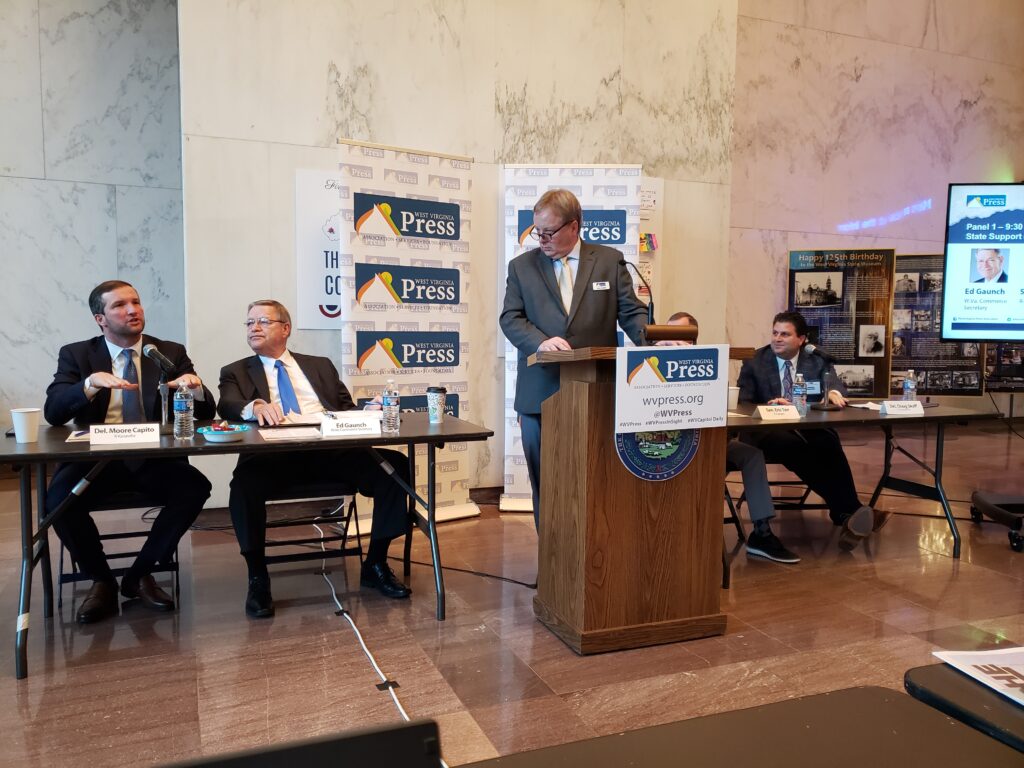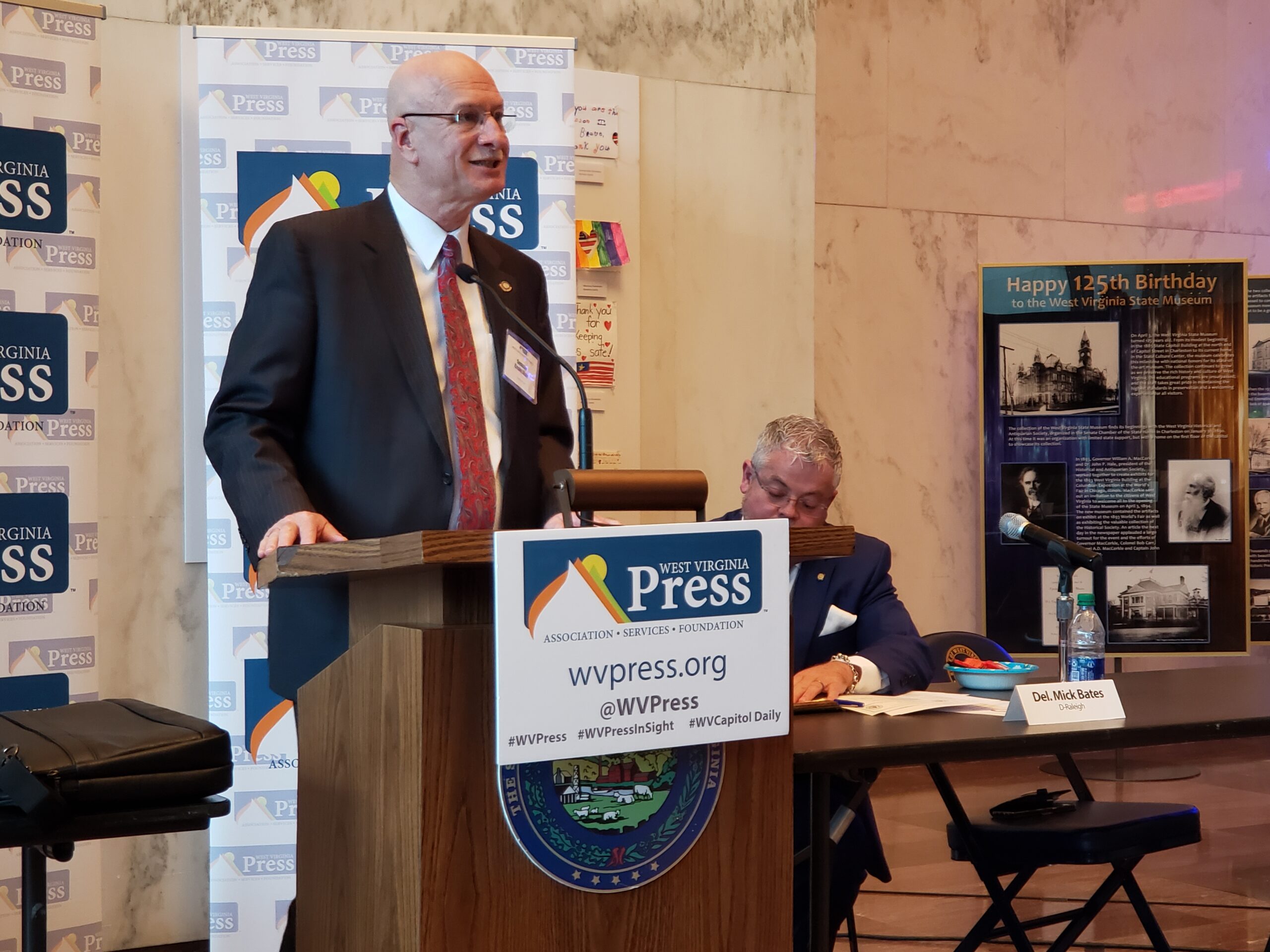CHARLESTON – Republican legislative leaders hope to eliminate a tax they see as the primary hurdle to business blossoming in West Virginia. Democrat leaders are hesitant, without certainty that the move won’t hurt counties and schools.
The tax in question is the personal property tax on equipment and machinery. Legislators have talked about it for more than 30 years, and brought it up again Friday morning during the West Virginia Press Association Legislative Lookahead at the Capitol campus. It was one of several topics raised during sessions on the budget, tax reform and economic development.
Along the way, the China energy deal and LGBTQ fairness legislation also cropped up.
The inventory tax has long been seen as a major hurdle to existing businesses investing in new equipment, and as a hurdle to businesses relocating here. The problem is that the tax brings in about $250 million to $300 million per year. About 36 to 37 percent goes to county school boards, about 26 to 27 percent to counties, and about 5 percent to municipalities.
Senate Finance chair Craig Blair, R-Berkeley, said Friday they’d be targeting about $100 million of the tax. “This is the final big lift. We must get there.”

Part of the problem will be alleviated, he said, because school enrollment has been dropping, which means fewer per-student dollars need to go to the schools. Last year, the state lost about 4,200 students; this year, another 3,500 to 4,000 may be gone.
If a means can be found to keep the schools whole, he said, it could contribute to economic growth, which in turn generates more wages and more taxes, and could fund more raises for underpaid state employees.
But a change in tax structure requires voter approval of a constitutional amendment, which in return requires two thirds of both the House and the Senate to approve a resolution to put an amendment on the ballot.
Sen. Corey Palumbo, D-Kanawha and a Finance member, acknowledged that the tax has been a problem for decades. But it’s not politically feasible to shift the tax burden from businesses to homeowners via higher property taxes. Without the right mechanism to make up the loss, he doesn’t see enough Democratic support to pass a resolution.
Also, he said, the Tax Foundation rates West Virginia’s business tax burden as 19th best in the nation, better than all of our neighbors. So he’s not sure how much impact this change might make.
Delegate Mick Bates, D-Raleigh and House Finance minority chair, agrees that the move is a nonstarter if no replacement revenue is found. The budget overall is no problem. Right now it’s about $33 million below estimates, but that’s small compared to some prior years and easy to fill in. So the big money fight of the session will be this tax measure.
Blair said leadership again hopes to complete the budge process during the regular 60-day session, without going into an extended session at extra expense. They’ll do that the same way they did last year, by moving money bills early in the session. “It’s not too hard to do that when you prioritize your bills.”
During a Q&A session, the legislators fielded a question on the $300 million Medicaid surplus and whether the Legislature has used it properly.
Bates said that the inclination has been to use it for shortfalls in other areas rather than for healthcare needs where it can draw a 3-to-1 federal dollar match.
“I think we need to be careful about using this as a piggy bank,” he said. There are plenty of healthcare needs out there. For one, $19 million could wipe out the 1,000-person waiting list for the I/DD Waiver program.” We have a moral obligation to take care of that problem.”
Economic development
Economic development isn’t a simple issue, said Sen. Eric Tarr, R-Putnam and a member of the Economic Development Committee. It requires multiple bills involving nearly every committee. “We don’t have a silver bullet but we have a lot of silver buckshot to throw at it.”
Some of the session covered West Virginia’s lowest-in-the-nation workforce participation rate and getting people back to work.
Delegate Moore Capito, R-Kanawha and member of the Technology and Infrastructure Committee, said they’ve been trying to break down some of the legal barriers to people entering and re-entering the workplace, barriers that erode hope for so many. Last year, they passed second-chance and expungement bills for nonviolent offenders to clear their names and records.
But other barriers remain. One is suspended or revoked drivers licenses – which can be done without a conviction – in a state where the terrain and rural setting don’t allow for robust mass transit. They need to find ways to get unemployed workers back into their cars.
Commerce Secretary Ed Gaunch said that there’s no one-size-fits-all strategy for the state. Different regions have different needs, and Commerce is tailoring plans on a regional basis.
The session took off on a tangent with a question about the legislators’ support for fairness legislation targeting the LGBTQ community.
“There is no place for discrimination in the state of West Virginia,” Capito said, and the topic will be discussed.
Tarr said he’d oppose it based on the increased potential for lawsuits. More than 85% of the state’s small businesses employ fewer than 20 people. Creating a new protected class based on sexual identity or preference creates a new cause of action against a small business.
And the buisness’ insurance company might choose to settle rather than fight. So a plaintiff’s attorney gets a big check for doing little more than sending a letter threatening action. “This bill is dangerous,” he said.
On the other side, Delegate Doug Skaff, D-Kanawha, said he takes calls every month form companies that would like to come here and are waiting for nondiscrimination legislation to pass. “This is 2020, everybody. I can’t believe we’re still talking about this.”
Gaunch fielded a question on what’s become of the $83.7 billion China Energy agreement announced in 2017.
Gaunch said the announcement should never have been made, and he doesn’t know why it was. It was handled backwards.
The announcement involved a memorandum of understanding about what the Chinese might spend if a lot of ifs fell into place. Typically, there’s two years of due diligence before something’s announced. “This one was announced before anything happened. Don’t ask me why it was announced two years ago.”
But the Chinese have been doing due diligence. He couldn’t say more because the MOU incudes a nondisclosure agreement. “Is there a project imminent? I can’t tell you that. I can tell you we’re closer to that than when it was announced.”
TWITTER @dbeardtdp Email David Beard at dbeard@dominionpost.com




